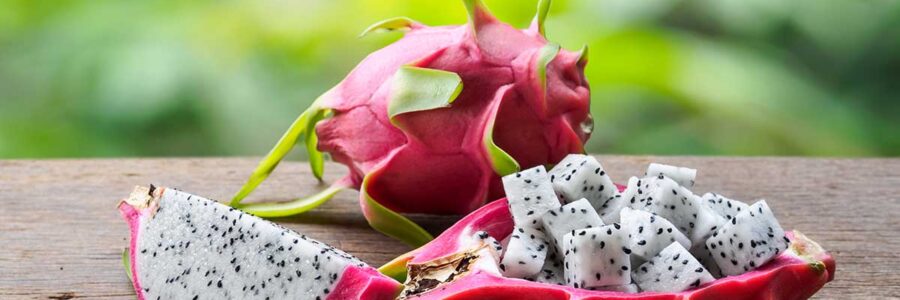Amid the continuous search for superfoods, dragon fruit emerges as a vibrant contender, captivating with its striking appearance and a spectrum of potential Dragon Fruit Health Benefits. Known also as pitaya, this Central American native, now thriving globally in tropical and subtropical climates, offers more than just an exotic flavor profile. Its sweet and mildly tangy taste and kiwi-like seed texture position dragon fruit as a culinary delight and a nutritional boon. Delving into the essence of dragon fruit reveals its role as a formidable ally in promoting health and wellness.
Nutritional Virtues of Dragon Fruit
Beyond its fantastical appearance with bright pink skin and dotted pulp, dragon fruit is a nutritional treasure trove. It’s endowed with vitamins C and E, teeming with antioxidants, and is a mineral-rich source of iron, calcium, and phosphorus.[1] The fruit is notably high in dietary fiber, contributing to digestive health and weight management by promoting satiety.[1] This makes dragon fruit a standout choice for those seeking to balance nutrient intake with calorie awareness.
Enhancing Immune Function
Dragon fruit’s significant vitamin C content is vital for strengthening the immune system helping shield the body from infections and diseases.[1] Its flesh, rich in betalains, combats oxidative stress and inflammation, supporting the body’s immune defenses. Studies underscore the importance of antioxidant-rich foods like dragon fruit in maintaining immune health and warding off common health issues.[2]
Cardiovascular Health Ally
Given the global emphasis on heart health, dragon fruit is a heart-beneficial food. Its blend of fiber, monounsaturated fats, and antioxidants contributes to cardiovascular well-being.[1] Dietary fiber aids in cholesterol management, which is crucial for preventing heart disease, while the fruit’s antioxidants, such as flavonoids, play a role in reducing heart disease risk by preventing cholesterol oxidation.[3]
Digestive Health Promoter
Dragon fruit stands out for its digestive health benefits, largely attributable to its high fiber content. This fiber not only eases digestion but also acts as a prebiotic, nurturing beneficial gut bacteria and fostering a healthy digestive tract.[4] A robust gut flora is essential for efficient nutrient absorption, immune efficacy, and even mental health, highlighting the broad impact of incorporating dragon fruit into one’s diet.
Blood Sugar Regulation and Skin Health
The fruit’s low glycemic index makes it a smart choice for those managing blood sugar levels, as it avoids spikes in glucose levels. Its fiber further assists in blood sugar stabilization, offering potential benefits for diabetes management.[5] For skin health, dragon fruit’s antioxidant properties, including vitamin C and flavonoids, support skin elasticity and combat the signs of aging, offering a pathway to healthy, glowing skin.[5]
Incorporating Dragon Fruit into Your Diet
Enjoying dragon fruit is simple and versatile. It can be eaten fresh, blended into smoothies, added to salads, or mixed into yogurts and parfaits. Grilling dragon fruit can unlock a caramelized sweetness, further diversifying its culinary uses. This adaptability makes integrating dragon fruit into meals and snacks easy, enriching the diet with its unique flavors and health benefits.
Conclusion
Dragon fruit transcends its exotic appearance, offering profound health benefits ranging from immune support and heart health to digestive well-being and skin vitality. Its nutritional profile and versatility in diet incorporation make dragon fruit a worthy addition to the roster of superfoods. Embracing dragon fruit enriches the palate and contributes to a holistic approach to health, underscoring nature’s provision of nourishing and healing foods.
References:
- Attar, Şule Hilal et al. “Nutritional Analysis of Red-Purple and White-Fleshed Pitaya (Hylocereus) Species.” Molecules (Basel, Switzerland) vol. 27,3 808. 26 Jan. 2022, doi:10.3390/molecules27030808
- Wilson, Douglas W et al. “The Role of Food Antioxidants, Benefits of Functional Foods, and Influence of Feeding Habits on the Health of the Older Person: An Overview.” Antioxidants (Basel, Switzerland) vol. 6,4 81. 28 Oct. 2017, doi:10.3390/antiox6040081
- Soliman, Ghada A. “Dietary Fiber, Atherosclerosis, and Cardiovascular Disease.” Nutrients vol. 11,5 1155. 23 May. 2019, doi:10.3390/nu11051155
- Guan, Zhi-Wei et al. “Soluble Dietary Fiber, One of the Most Important Nutrients for the Gut Microbiota.” Molecules (Basel, Switzerland) vol. 26,22 6802. 11 Nov. 2021, doi:10.3390/molecules26226802
- Pullar, Juliet M et al. “The Roles of Vitamin C in Skin Health.” Nutrients vol. 9,8 866. 12 Aug. 2017, doi:10.3390/nu9080866


